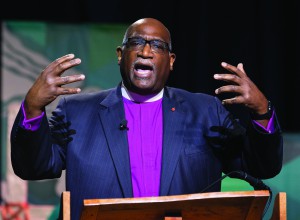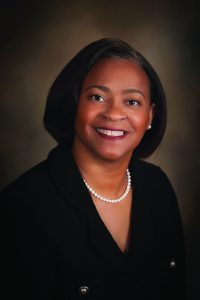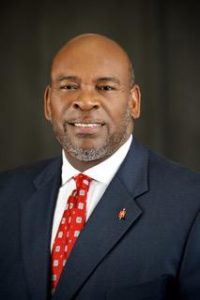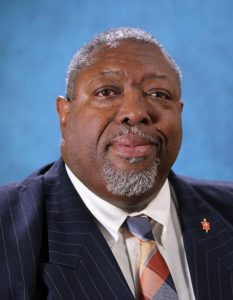
Bishop Gregory V. Palmer delivers the episcopal address during the 2016 United Methodist General Conference in Portland, Oregon. Photo by Mike DuBose, UMNS.
“What a season we have been through and what a week we are in,” wrote Bishop Gregory V. Palmer of the West Ohio Annual Conference. “The angst and pain are palpable. I need you to know I share that pain and I see me in some way shape or form every time I see video clips from Minneapolis and around the country. I have no illusion. It could have been me. That’s the world in which we live.
“The death of George Floyd is a painful sequel to much that we have seen before,” Palmer continued. “God help us if you please. I grieve for the Floyd family and all the families that have had the same or similar experience. God heal their hearts. I shudder as I watch the burning in Minneapolis, but I do watch and choose not to look away. Looking away perpetuates avoidance. I look not to condone but to be drawn deeper into the compassionate heart of Jesus our savior. Lord give us eyes to see.” (His entire message is found HERE.)
Within our society and around the world, the horrific deaths of George Floyd, Breonna Taylor, and Ahmaud Arbery have sparked passionate protest, intense soul-searching, and purposeful prayer. At this time, Christians are looking for ways to be a faithful witness to the Gospel of our Lord Jesus and his kingdom of compassion, righteousness, and justice.
Our national, state, and local leaders are in need of great wisdom at this time. This also goes for the leaders of The United Methodist Church. Local pastors are in need of prayer, as are our bishops. Here are statements from four bishops that may help you think, pray, and respond with greater spiritual insight.

Bishop Sharma Lewis
“When do we as children of God decide that God is calling us into action? When do we decide that mere words or social media interactions for a few days are just not enough?
“When do we as children of God decide that the systemic racism in our society, whether manifested overtly or covertly, is a sin that hinders our relationship with Jesus Christ and is antithetical to the gospel?”
https://vaumc.org/bishop-lewis-calls-for-action-against-systemic-racism/

Bishop Bruce R. Ough
“Now, it is our responsibility as persons of faith, and particularly as followers of Jesus in the Methodist tradition, to address this pervasive pandemic of racism. We are compelled to address this pandemic with the same intensity and intentionality with which we are addressing COVID-19.
“We begin by acknowledging that racism is sin and antithetical to the gospel. We confess and denounce our own complicity. We take a stand against any and all expressions of racism and white supremacy, beginning with the racial, cultural, and class disparities in our state and country that are highlighted by the coronavirus pandemic.”
https://www.unitedmethodistbishops.org/newsdetail/pandemic-of-racism-14011039

Bishop Jonathan Holston
“As United Methodists and followers of Christ, we commit ourselves to social justice and to opposing racism in all of its forms. We encourage frank and thoughtful conversation and respectful collaboration with a common goal of justice for all. It is our obligation to be a beacon of love when hatred threatens to blot out the light of hope.”
Bishop Holston wrote in a later statement, “When we witness inexplicable injustice, anger is understandable, protest is appropriate, and action is vital. Violence and destruction, though, is never the answer.
“We are encouraged to see people flood the streets to peacefully call for justice and an end to oppression. This is faith in action – the bedrock of our commitment to social justice as United Methodists and followers of Christ.”

Bishop Frank J. Beard
“It is the job of every Christian to serve as conduits of grace, mercy, and love so that the dark forces of our world might experience the liberating light of Jesus Christ. It is our job to help stamp out hatred in any form. Therefore, I encourage all United Methodist to pray for the families that are affected by this most recent tragedy, as well as those suffering a similar plight in recent months. I remind us all that it is our duty, as sisters and brothers, to stand-up, speak-out, and advocate for those that are hurting and marginalized, so that justice may become a reality.”
https://www.igrc.org/blogpostsdetail/14010915
In a separate statement, Bishop Beard offered practical suggestions as we wrestle with the issues of race, prejudice, and injustice.
“Dealing with racism is not easy and it takes a lot of energy and forethought that will often move us into uncomfortable places. Speaking up and out is important, even though people often are scared to say anything because they worry that if they say the wrong thing, they might get in trouble or find themselves being labeled. It is crucial for Christians to create safe sanctuaries where we can have difficult conversations about racism and other topics that promote injustice.”
Beard offered 10 ways that Christians can begin to “address systemic injustice and discrimination.”
- Becoming aware of policies and practices that promote disparities based on race, ethnicity, stereotypes, or economic status.
- By employing the use of empathetic listening that is engaging and helps with validating the feelings and personal experiences of persons of color, without being dismissive or making explanatory comments that seek to rationalize or soothe away their pain.
- Learn to recognize and understand your own privilege and experiences that are based on skin color and power.
- Share your own story as you engage in tough conversations about race and injustice. Your story will help foster deeper understanding for you and for others as you interact together.
- Recognize that America is NOT a “melting pot” but rather a “garden salad” containing a blend of unique colors and flavors meant to be experienced together. DO Not give in to the myth that you must be “color blind.”
- Seek to identify with those that are marginalized and who face the effects of a system that thrives and survives on racist behavior and practices.
- Use the power of your own personal finances by taking a stand with your money. Be aware of the practices of those you do business with.
- Create safe places for difficult conversations, utilizing people experienced in providing diversity training.
- Develop and foster relationships with people of color based on mutual respect and concern for each other’s well-being.
- As people of faith, pray for and with others, that Jesus’ prayer for unity would become a reality.






I am surprised there are no comments for this article. It includes passionate appeals.